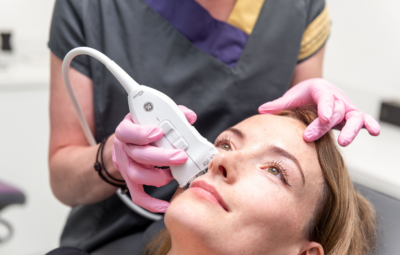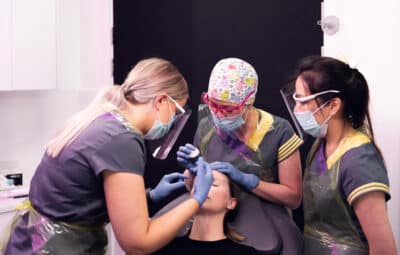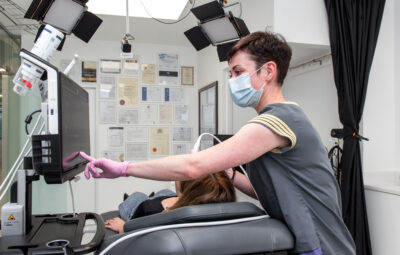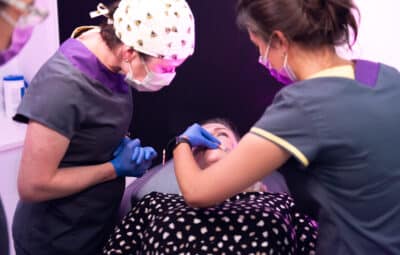
How to Become a Successful Aesthetic Nurse
5 February 2024
In this post:
- The aesthetics industry has rapidly become the most lucrative and flexible career path for nurses looking to leave their traditional NHS roles.
- There are many steps and considerations nurses must take before pursuing aesthetic training or a career in aesthetic medicine.
- When looking for suitable filler or Botox courses for nurses, some of the important things to look at are if the course is accredited, who instructs the course, and whether the post-course support is offered.
- If you decide to become an aesthetic or Botox nurse, there will be challenges, but the rewards will make all of your hard work worth it.
Many nurse prescribers within the NHS are contemplating new career directions that align more closely with their personal and professional aspirations. If you’re an NHS nurse prescriber and have considered broadening your career into aesthetic medicine, you’re not alone.
The demands of a career in the NHS are intense and multi-faceted. Stress and burnout, long hours, high patient loads, and the emotional weight of dealing with critical care scenarios can become overwhelming.
Career progression may sometimes seem constrained, and the impact on work-life balance can be substantial. Add to this the disproportionately low pay, which does not align at all with the challenges nurses face. These factors, coupled with an increasing bureaucracy and the exceptional pressure brought on by the COVID-19 pandemic, have led many to reassess their careers.
Enter aesthetic medicine. This industry presents an appealing alternative or a complementary addition to your career. It offers an entirely different environment, focusing on enhancement rather than illness, and carries with it a different set of rewarding challenges. A career in aesthetic medicine can not only provide a refreshing change but also offer greater flexibility, the potential for increased earnings, and a newfound sense of career control.
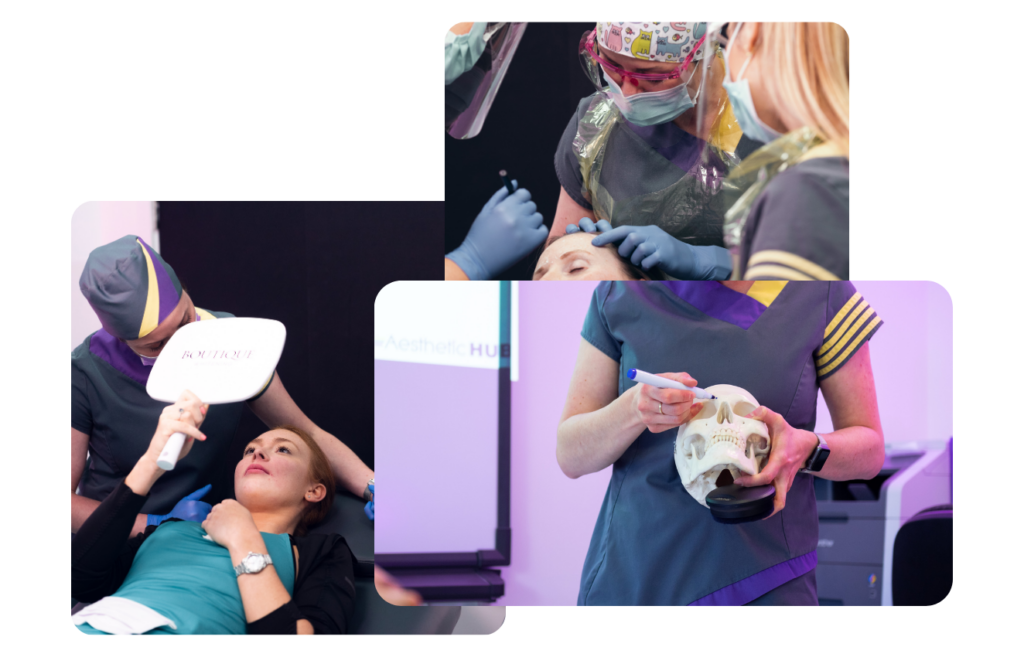
It’s important to understand that this transition doesn’t imply abandoning the valuable skills you’ve acquired as a nurse prescriber. On the contrary, it’s about leveraging those skills, expanding your horizons, and bringing your expertise to a field where you can make a profound difference in people’s lives in a new and exciting way.
Embrace this exciting journey into aesthetic medicine and rediscover the joy and fulfilment of your nursing career. The opportunity to shape your professional life awaits you. Let’s delve further into the rewarding pathway that aesthetic medicine can offer to you as a nurse prescriber.
What are the benefits UK nurses get in aesthetic medicine?
1. Increased Earning Potential
Aesthetic medicine can be a lucrative career path. Procedures such as Botox injections and lip fillers are often high in demand, providing potential for a substantial income.
2. Independence
As a nurse prescriber, you have the ability to work independently. This means that you can potentially start your own practice without needing a supervising physician, granting you more control over your work schedule and environment.
3. Career Growth and Diversification
The aesthetic industry is constantly evolving, with new techniques and treatments continually being introduced. This offers a great opportunity for continual learning and skill development. It can also provide a stimulating alternative or supplement to more traditional nursing roles.
4. Creative Outlet
Aesthetic medicine combines medical knowledge with an artistic element. For those with a keen eye for beauty and symmetry, this field can offer a satisfying creative outlet.
5. Personal Satisfaction
Helping patients improve their self-confidence by addressing their aesthetic concerns can be very rewarding.
6. Flexible Hours
Depending on your work setting, you may have the ability to set your own hours or work part-time. This can be a great benefit for those seeking a better work-life balance.
7. Growing Industry
The aesthetic medicine industry has seen significant growth in recent years and is expected to continue growing. Starting a career in this field now can set you up for a promising future.
Please note that while there are many benefits, aesthetic medicine also comes with its own set of challenges. It’s crucial to get the proper training and certification, stay updated with industry changes, and adhere to high standards of patient care and safety.

What qualifications do you need to start out in aesthetic medicine?
Aesthetic medicine is a field that requires specific qualifications and training.
In the UK, a nurse who has a prescribing qualification and is registered with the Nursing and Midwifery Council (NMC), or equivalent regulatory body, is legally permitted to administer dermal fillers. This is due to the current status of dermal fillers as an unregulated treatment.
However, while dermal fillers can be administered without further qualifications, a few factors can significantly impact the success and safety of the nurse’s practice in aesthetic medicine:
1. Aesthetic Training Course
Although not legally mandated, it is highly recommended to complete a comprehensive aesthetic training course. These courses equip nurses with a thorough understanding of facial anatomy, ageing, and dermal fillers, and often include practical, supervised training.
2. Prescribing Qualification
While dermal fillers don’t require a prescription, being able to prescribe is advantageous. For instance, treatments like Botox are prescription-only, and being able to prescribe allows a broader scope of practice. In case of complications from dermal fillers, hyaluronidase, the enzyme used to dissolve hyaluronic acid dermal fillers, also requires a prescription.
3. Insurance
Although dermal fillers are unregulated, obtaining appropriate aesthetic insurance is a must to cover potential malpractice claims.
4. Continuous Professional Development
Given the rapidly evolving nature of aesthetic medicine, ongoing training, and staying updated with the latest techniques, safety guidelines, and emerging trends is paramount to ensuring a successful and safe practice.
It’s crucial to bear in mind that although the regulations might permit administering dermal fillers without additional qualifications, obtaining appropriate training is strongly advised to ensure patient safety and successful outcomes.
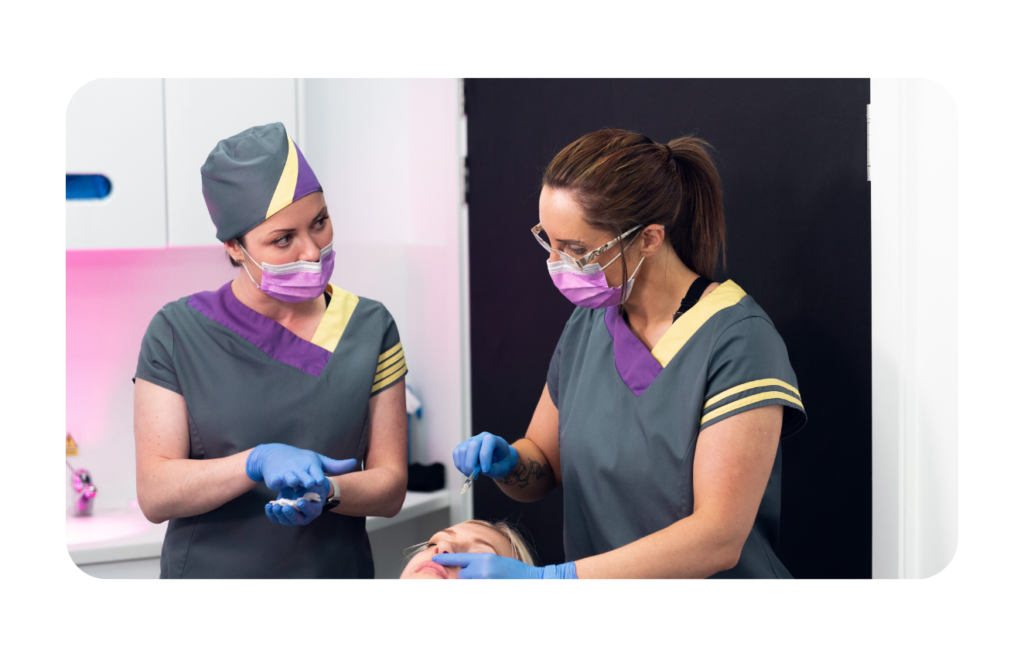
What should I look for when choosing my aesthetic course?
When deciding to undertake a course in aesthetic medicine in the UK, a registered nurse prescriber might ask the following questions:
1. Is the course accredited?
Accreditation is a marker of quality and ensures the course is recognised by professional bodies. In the UK, this could be accreditation by CPD or another reputable organisation.
2. What is the course curriculum?
The course should cover in-depth anatomy, techniques for various aesthetic procedures (like Botox and lip filler), managing complications, and ideally have a good balance between theoretical knowledge and hands-on practice.
3. Does the course offer hands-on training?
Practical experience is crucial in aesthetics. Ensure the course offers supervised, hands-on training with live models.
4. Who are the course instructors?
Look for experienced practitioners who are well-respected in the field of aesthetic medicine.
5. What support is offered post-training?
It’s essential to have ongoing support after training, whether in the form of mentorship, access to resources, or being part of a professional network.
6. What are the course timings and format?
To accommodate your current work or personal commitments, you might prefer flexible learning options like online or part-time courses.
7. What is the cost of the course?
Consider if the cost matches the value provided. Look for transparency in course fees and ensure there are no hidden costs.
8. Does the course assist with business and marketing aspects?
If you plan to set up your own practice, it can be beneficial if the course also covers elements of running a business in aesthetic medicine.
9. What have past students said about the course?
Reviews and testimonials can give you a sense of what to expect from the course.
10. What qualifications or certificates will I receive upon course completion?
Certificates can enhance your credibility with potential clients and employers.
These questions will help ensure the course meets your needs and will equip you with the necessary skills and knowledge for a successful career in aesthetic medicine.
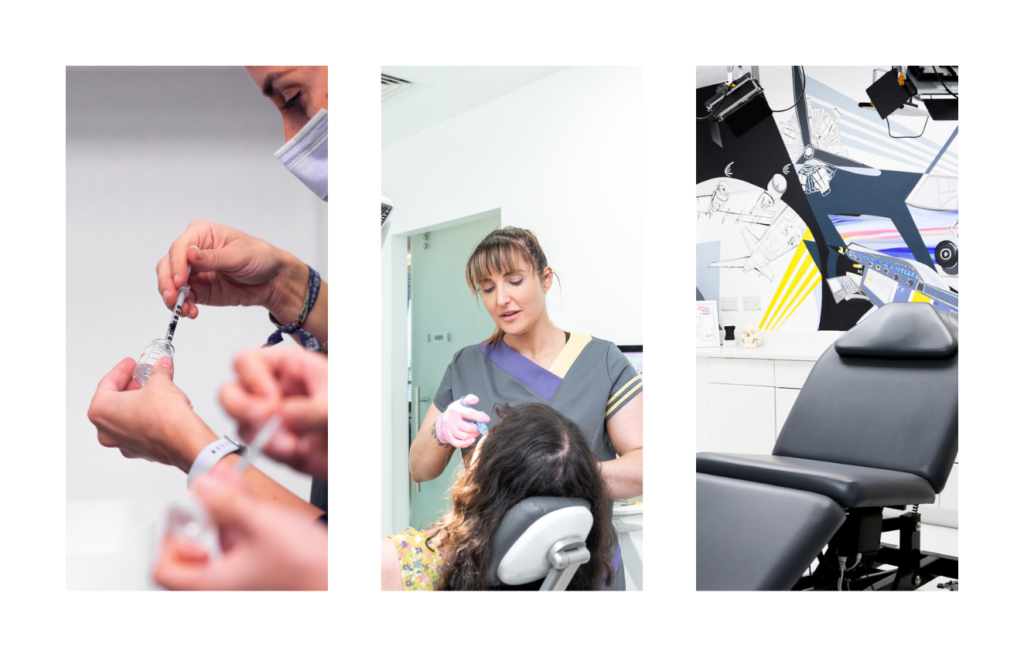
Considerations
When deciding to undertake a career in aesthetic medicine, a UK registered nurse might have the following concerns:
1. Lack of Experience
Transitioning into a new field can be daunting. Nurses might worry about their lack of experience in aesthetic procedures and managing potential complications.
2. Patient Safety
Aesthetic medicine, though minimally invasive, still carries risks. Nurses might be concerned about ensuring patient safety and managing potential adverse events.
3. Regulation and Legalities
Given the partially regulated nature of aesthetic medicine, navigating the legal aspects of practice might cause worry.
4. Training Quality
With a wide range of courses available, determining which provide the most comprehensive, high-quality training can be challenging.
5. Financial Implications
The cost of training, setting up practice, and obtaining necessary insurances can be substantial.
6. Balancing Commitments
Nurses may worry about managing their current work commitments alongside training and potentially running their own practice in the future.
7. Keeping Up-to-Date
The field of aesthetic medicine is rapidly evolving, and staying current with the latest techniques and best practices is crucial.
8. Business Management
If considering setting up their own aesthetic practice, nurses might feel anxious about the business aspects, including marketing and managing a business.
9. Reputation
The desire to provide high-quality care and establish a good reputation in a new field can also be a source of worry.
10. Job Security and Stability
Transitioning from a potentially stable job role as a nurse to a career in aesthetic medicine, which can have variable patient demand, might lead to concerns about job security and financial stability.
By addressing these concerns through solid training, mentorship, careful planning, and networking, nurses can build confidence and set the foundation for a successful career in aesthetic medicine.
Become an Aesthetic Nurse Today!
Meet the Smileworks Aesthetic Training HUB – an esteemed aesthetic training centre based in the UK. We pride ourselves on our wide range of online and hands-on courses tailored for every skill level. Whether you’re taking your first steps into the world of Botox and fillers, or you’re an advanced injector aiming to master facial ultrasound techniques, we have the expertise and courses to suit your needs.
Stop pursuing a thankless career that doesn’t make you happy.
Don’t let financial limitations keep holding you back from living your fullest life.
It’s time to embrace the prospering world of aesthetic medicine. The HUB provides you with all the right training and guidance you need to succeed. Take control of your professional journey and step into a future filled with endless potential and opportunities.
Join us at the HUB. Let’s shape the future of aesthetic medicine together and ensure safe, effective, and transformative results for every patient.
Want to try out our courses before committing? Take advantage of our free trial for a taste of what learning at the HUB is like.
